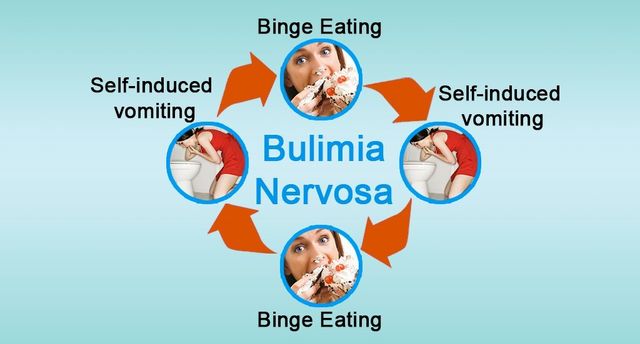Symptoms of bulimia include uncontrollable binge eating, secrecy about eating habits and body weight, persistent obsession with weight and body shape, and frequent mood swings. Physical consequences of bulimia can include damage to the stomach and gastrointestinal tract, electrolyte imbalances that can lead to heart problems, erosion of tooth enamel due to frequent vomiting, and even death in the most severe cases.
Treatment usually requires an integrated approach, including individual psychotherapy such as cognitive behavioral therapy (CBT), which aims to change negative patterns of thought and behavior, family therapy to improve interpersonal relationships and communication, and, if necessary, medication for depression or anxiety. An important aspect of treatment is nutritional counseling and training in healthy eating habits to restore a balanced and regular eating pattern. Successful treatment also includes long-term support and care to prevent relapse and promote a healthy relationship with food and your body.
In bulimia, the behavioral signs can be varied and complex, as the disorder affects both the psychological and physical parts of the personality, and its symptoms are often hidden as the person tries to hide their behavior from others.
It is important to emphasize that bulimia is a serious health disorder that requires professional help. Early intervention and an integrated treatment plan that includes psychotherapy, nutritional counseling, and sometimes medication can help individuals restore a healthy relationship with food and their body, as well as improve their overall quality of life.
:max_bytes(150000):strip_icc()/what-are-the-symptoms-of-bulimia-5210392_final1-adb1cd59bd5f465ba271914daf6d861b.png)
Bulimia is a complex eating disorder that is influenced by various psychological, social and biological factors. The interaction of these factors determines the development and course of the disorder, so understanding them is vital for effective treatment and prevention.
Psychological factors
Psychological factors play an important role in the development of bulimia. These include low self-esteem, perfectionism, difficulty managing emotions, lack of adaptive skills, and adverse past experiences such as emotional or physical abuse. Individuals with bulimia often have problems with their identity and self-image, leading to dissatisfaction with their body appearance and weight. Psychological disorders such as depression, anxiety, and a strong sense that personal worth depends on external factors such as appearance or success are also associated with the development of bulimia.
Social factors
Social factors are also important in understanding the context in which bulimia occurs. These include societal standards of beauty, thinness, and success that are strongly embedded in society and promoted through media, social media, and personal relationships. These expectations can put a lot of pressure on a person's self-esteem and body image. Social exclusion, bullying, family dynamics and relationships such as excessive levels of parental control or expectations also contribute to the risk of bulimia.
Biological factors
Biological factors, including genetics and changes in brain chemistry, are also important in understanding bulimia. Research shows that bulimia can run in families, suggesting that genetic factors may increase an individual's vulnerability to the disorder. In addition, imbalances in neurotransmitters such as serotonin and dopamine can affect emotional stability, appetite, and satiety, which can contribute to the development of eating disorders.
With bulimia, it's important to know that seeking help is a step toward recovery and that there are a variety of resources that can provide the support and treatment you need. Seeking help early and starting the right treatment are very important factors in improving treatment prospects and good health.

# bulimija # valgymo sutrikimas